Reptile Enthusiasts and Environmental Advocates to Crash FWC Day at the Capitol
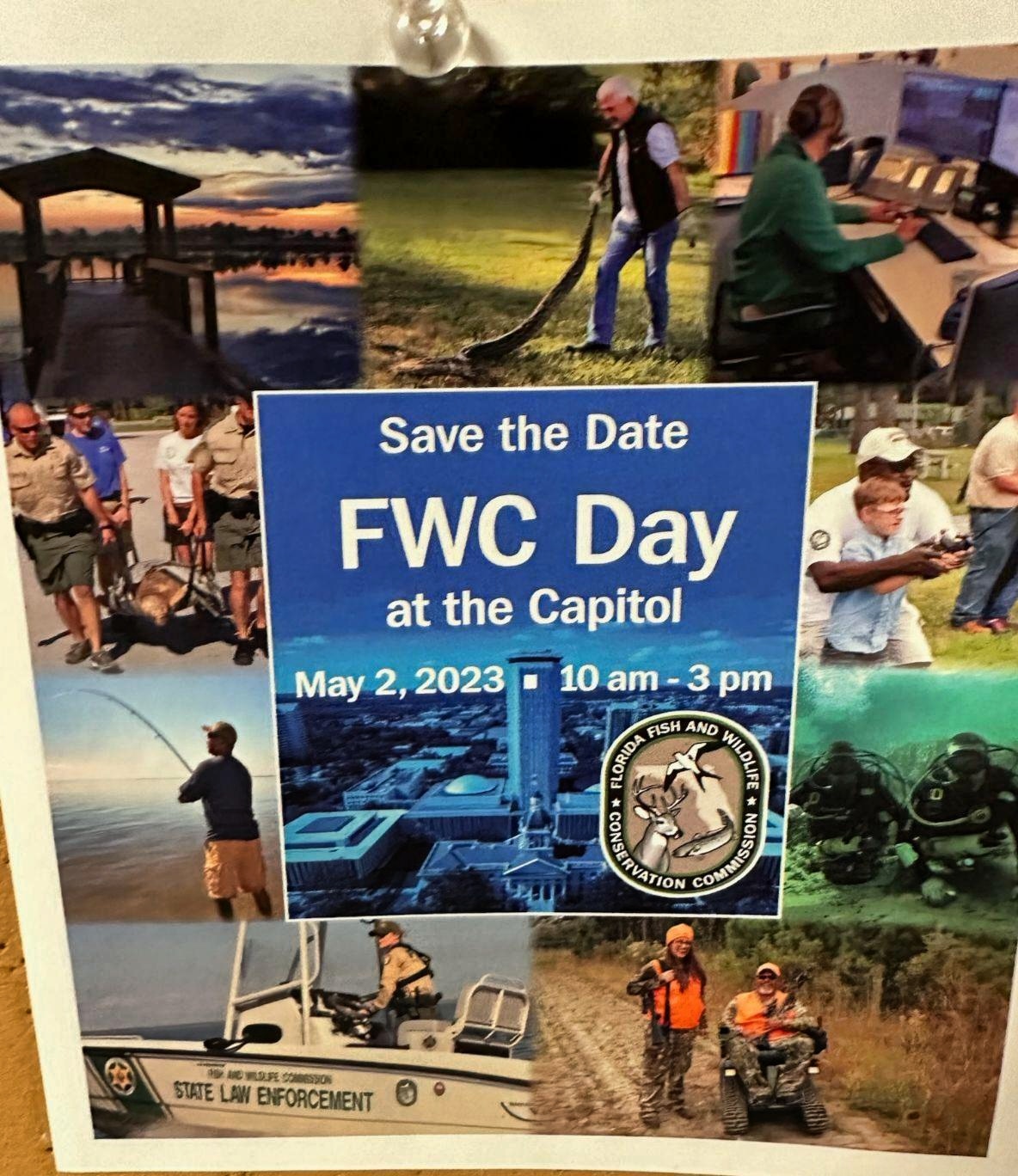
Though FWC has not put out a press release on the event, this flyer was seen on a bulletin board in the Florida Capitol Building
In the wake of the “Holy Thursday Massacre” on April 6, 2023, a date on which FWC officers killed around three dozen pet snakes including a pregnant Boa constrictor, FWC has quietly announced “FWC Day” at the Capitol for May 2, 2023. The FWC snake slaughter has garnered worldwide media attention and the outrage of animal keepers the world over. Reptile enthusiasts and environmental advocates plan to attend FWC’s lobbying event on Tuesday to inform legislators of FWC’s egregious overreach, killing of animals, and environmental mismanagement.
In addition to Chris Coffee’s cherished pet python “Sweetie” and his other 30 some odd pythons, and Bill McAdam’s Boa “Big Shirl,” we now know that on April 6 FWC officers also killed a tame pet Reticulated python, which was caught in Pembroke Pines by 16-year old Onya Golightly. Golightly, who is known as a budding young snake enthusiast, was called in by a neighbor to wrangle the 10 foot snake, which seemed to be lost. She named the python “Frederick.” This capture was covered by local and national media. What was not covered was the follow-up visit by FWC officers, who seized the snake and promised to “kind the snake a good home” while citing Onya’s father Daniel Golightly with a warning violation for possessing a Prohibited Species. According to FWC’s incident report, this python was killed via bolt gun by Officer Jonathon Wright on the morning of April 6, just hours before Wright joined Officer Lex Corteguera at Bill McAdam’s facility with the bolt gun to dispatch Chris Coffee’s pythons.
FWC has made a statement claiming that the facility owner requested that they euthanize his pythons. Coffee, who was the owner of the pythons, disputes this statement, saying that he was threatened with arrest and that FWC gave him no other choice other than to allow the snakes to be killed. McAdam, who was the owner of the facility, but not the owner of the pythons, also says that he did not request that FWC euthanize the pythons. The body camera footage that FWC has released does not seem to be complete, but it does not back up the claim of FWC in their statement.
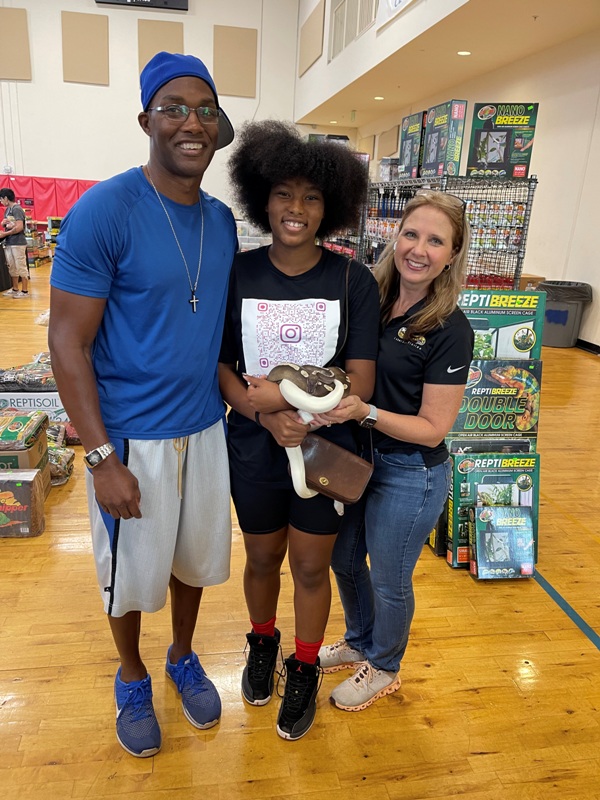
Above: Onya Golightly (with her pet Ball pythons) and her father Daniel Golightly recently met USARK FL President Elizabeth Wisneski at Repticon in Boyton Beach, FL. Onya caught “Frederick” the tame Reticulated python, which was killed with a bolt gun by FWC officer Jonathon Wright. (Photo by Elizabeth Wisneski, who has granted permission for this photo to be published and disseminated.)
Regardless of how you may feel about the types of animals involved, none of the Holy Thursday Massacre was necessary and there was no urgency surrounding this event. Big Shirl was a beloved pet Boa constrictor, a species of snake that is docile under human care and commonly kept as pets. A necropsy has revealed that Big Shirl was carrying 32 babies which were only a few weeks away from being born. Boas give birth to live young rather than laying eggs like many other snakes. USARK FL maintains that none of Coffee’s pythons should have been killed because they were legally owned prior to the administrative rule change. As a matter of law, they should have been grandfathered without condition. USARK FL is currently in a lawsuit with FWC challenging validity and constitutionality of these rules and has asked for FWC to stop seizing and euthanizing captive animals until this legal challenge is resolved. Contrary to some media reports, the Reticulated python is not an invasive species in Florida.
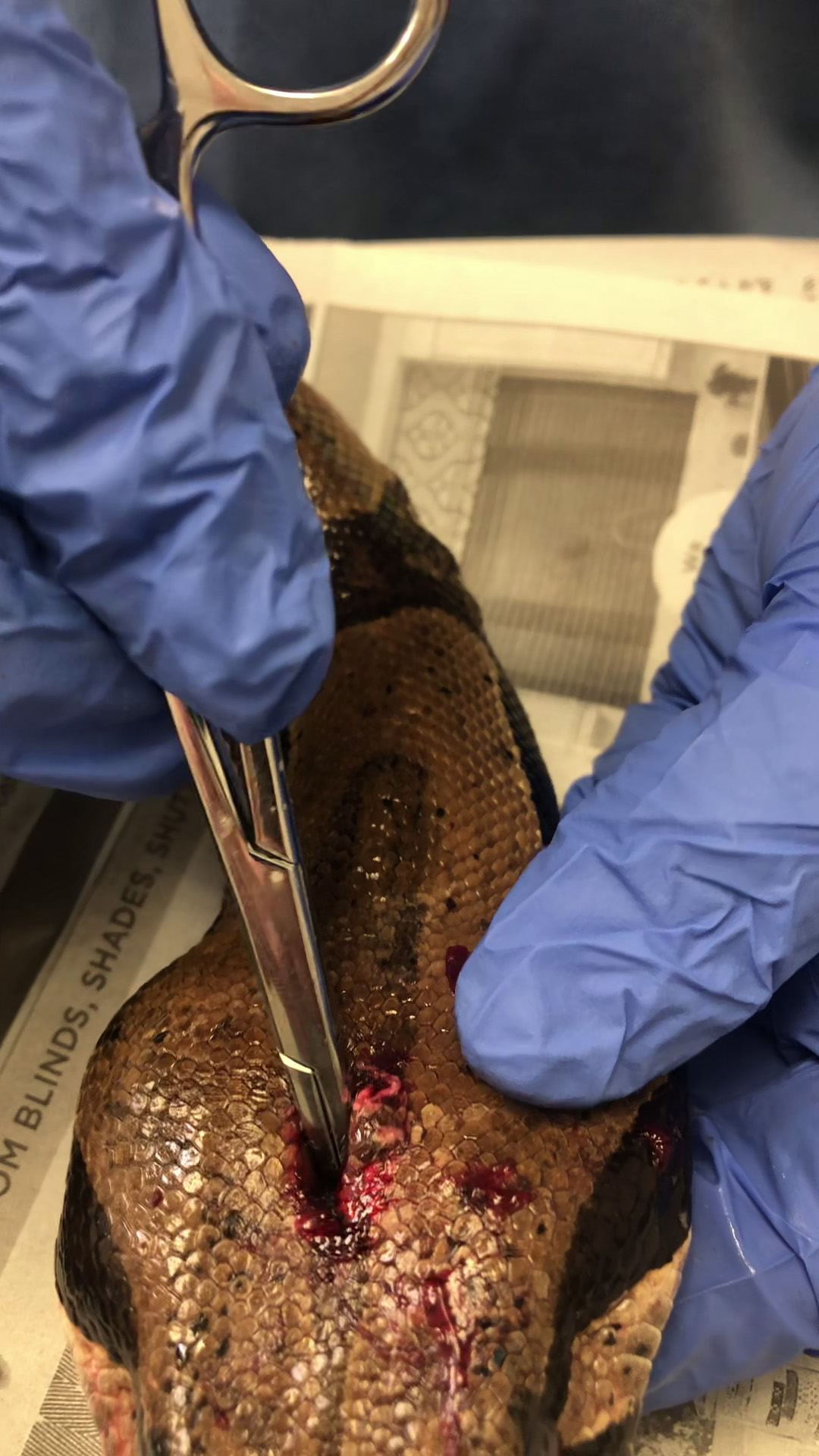
Above: The cause of death for Bill McAdam’s 10-year old female boa was a penetrating wound caused by a bolt gun charge, which passed entirely through the snake’s head and exited through the lower jaw. (Photo by Chris Nettles, who has granted permission for this photo to be published and disseminated.)
FWC’s killing technique has been condemned as cruel and inhumane. In the video of the incident recorded by Coffee, officers can be seen yanking snakes out of cages, administering a bolt charge to the head, and then leaving the snakes writhing on the floor or throwing them into trash cans. FWC’s own website describes a two-step euthanasia process for wild pythons. This process involves applying the bolt charge to the head, followed by the complete destruction of the brain by pithing. The officers in this case followed only one of two of those steps.
https://myfwc.com/wildlifehabitats/nonnatives/python/humane-killing-methods/
According to veterinarian Dr. Ivan Alfonso DVM, even the field methods FWC describes on its website were not adequate in this case. “Euthanasia guidelines provided by the American Veterinary Medical Association (AVMA) clearly distinguish between ‘in the field’ euthanasia methods versus pet euthanasia methods. These snakes were not wild. Even if they had been wild, using just the bolt gun was only one step in the euthanasia method. Being pets, these animals should have been afforded the pet euthanasia method which involves chemical immobilization or sedation and then chemical euthanasia. There was no urgency in this case. If actually necessary, this should have been conducted by a licensed veterinarian or properly-trained veterinary health professional,” said Alfonso. He added, “There is no excuse for using the bolt gun method on pet snakes or pets of any species. The AVMA lists bolt guns and pithing as a secondary method when nothing else is safe or possible on captive reptiles. This was not the case here.”
Dr. Alfonso referred us to page 92 of the AVMA Euthanasia Guidelines:
https://www.avma.org/sites/default/files/2020-02/Guidelines-on-Euthanasia-2020.pdf
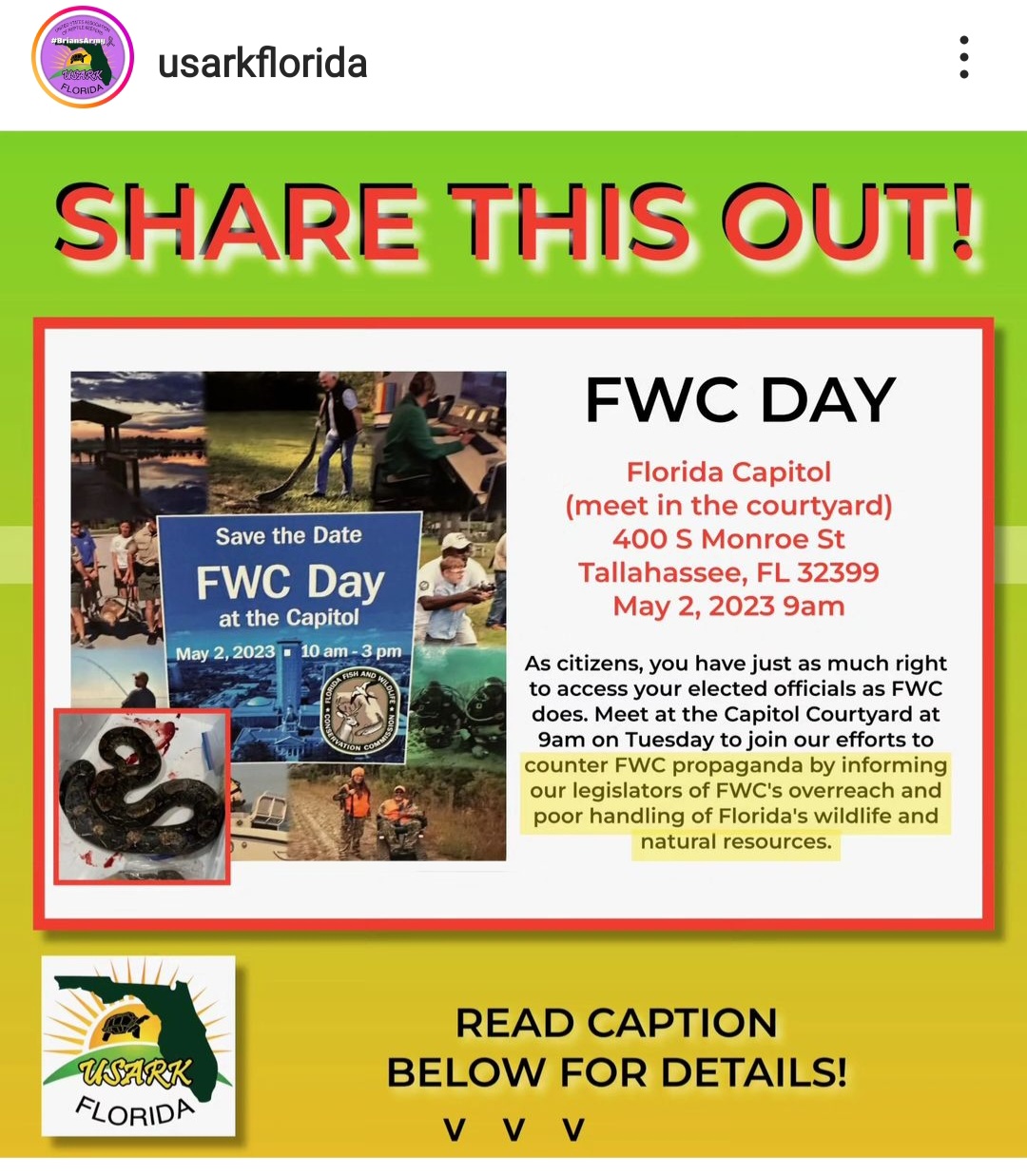
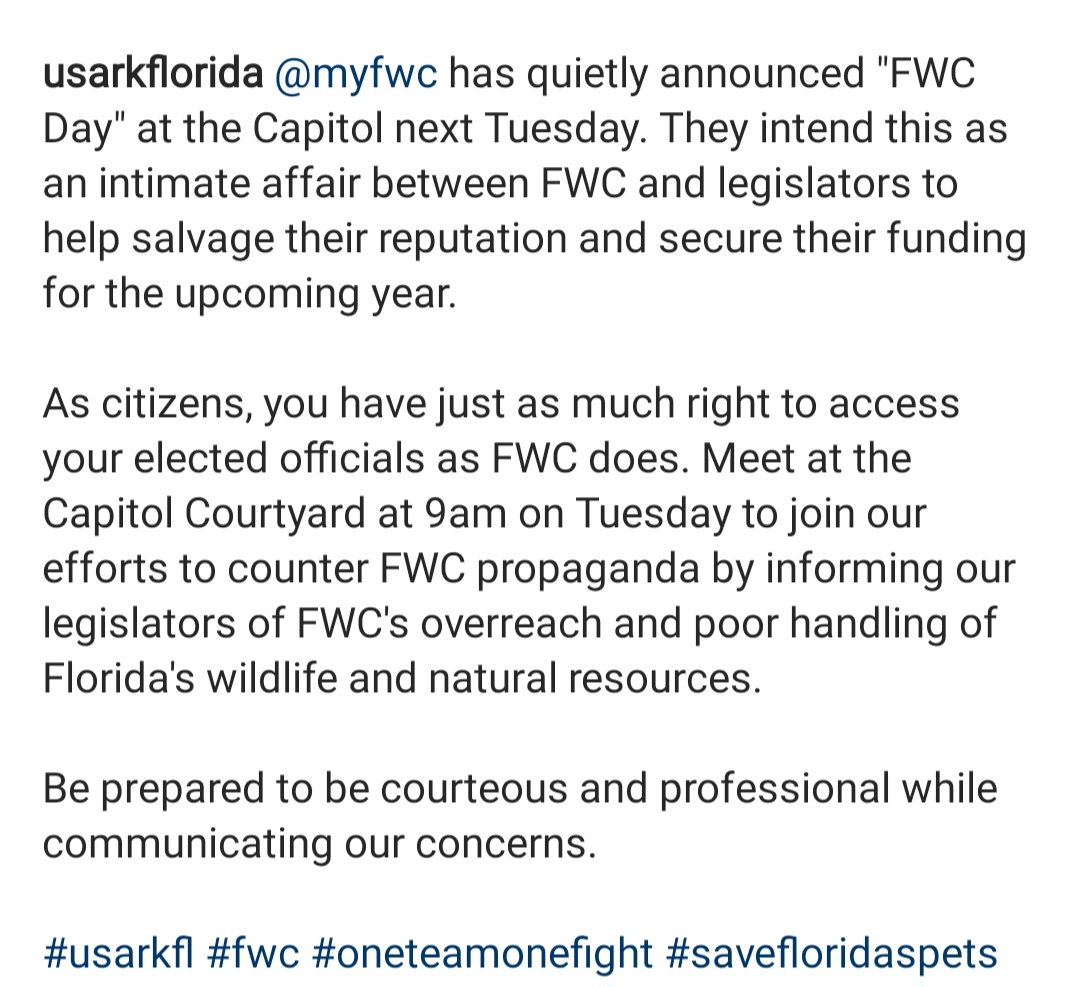
Above: The USARK recently made this post about “FWC Day” on social media
The United States Association of Reptile Keepers Florida (USARK FL) has posted on social media asking citizens to attend FWC Day at the Capitol and carry their own message to Florida lawmakers. USARK FL hopes to emphasize the following points.
Holy Thursday Massacre
-On April 6, 2023, FWC Officers killed over 30 pet snakes via bolt gun.
-FWC Officers carried out orders that they claimed came from Tallahassee.
-FWC killed a tame pet python named “Frederick,” which had been caught several days prior by 16-yearold Onya Golightly. Officers cited her father for possession of the snake and told them that the snake would go to a good home before killing it via bolt gun.
-FWC killed over 30 pythons, which were previously possessed legally by Chris Coffee under a permit from FWC before they ended that program.
-Coffee cried after FWC officers had him hold the head of his pet snake as they stuck a bolt through its head.
-In the course of killing Coffee’s pythons, including his cherished “Big Sweetie,” FWC officers “inadvertently” killed the facility owner Bill McAdam’s legal pet Boa constrictor named “Big Shirl,” which was pregnant with 32 babies.
-FWC killed all of these snakes by a single bolt gun blow to the head. Many writhed on the floor for a long period of time before being thrown into a trash can in front of their owner.
-The American Veterinary Medical Association recommends a two or three step process for euthanasia, depending on circumstances, which FWC did not follow.
-Vets have condemned FWC’s action as cruel and inhumane to animals.
-At no time did FWC officers mention FWC’s “Amnesty Program,” which FWC markets as a “judgement free” way to rehome pets.
-The Holy Thursday Massacre has received extensive media coverage, which has sparked worldwide outrage.
-FWC has shown little accountability for its egregious actions and has responded to outrage on social media by deleting thousands of negative comments, in violation of the 1st Amendment.
Video footage shot by Chris Coffee documenting the FWC massacre may be viewed on the USARK FL YouTube channel here:
https://youtu.be/BuimdwINSzk
(Please note that the location of this incident was initially incorrectly reported as Palm Beach County rather than Sunrise in Broward County.)
FWC-Big Government Killing Pets
-FWC has confiscated and killed pets, which are cherished family members.
-FWC law enforcement uses brutal and inhumane killing methods to euthanize pets, in violation of American Veterinary Medical Association guidelines.
-FWC has punished pet owners and businesses with draconian regulation.
-FWC has failed to provide reasonable grandfathering provisions for legally owned pets.
-FWC's crackdown on pet owners has done nothing to address invasive species issues.
-FWC’s shut down of iguana and tegu exports has led to increased wild populations.
-FWC has threatened Florida's animal industries, including the farmers of food animals.
-FWC is moving ahead with regulations without consent of the industries they will damage and the companies they will put out of business.
-FWC's current "Whitelist" regulatory proposals do not have the support of any of Florida's animal industries.
-FWC’s “Whitelist” places a huge burden on law enforcement, which will likely lead to more killing of animals.
FWC-Destroying Florida’s Natural Environment
-FWC has managed Florida's wildlife and natural environments poorly.
-FWC's policies benefit developers and chemical companies, to the detriment of Florida's wildlife and environment.
-FWC's excessive herbicide spraying kills native animals and plants.
-FWC's spraying of aquatic plants kills the foods of manatees and turtles, destroys habitat, and contributes to polluted water.
-FWC continues to starve manatees by spraying their preferred foods.
-FWC spraying leads to excessive nutrient loads, which cause algae blooms, red tide, loss of seagrass, and loss of marine life.
-FWC's contributions to red tide and toxic algae blooms threaten Florida's fish populations, fishing industries, and coastal recreation.
-FWC policies are leading to the deaths of Endangered birds, manatees, panthers, bears, sea turtles, and gopher tortoises.
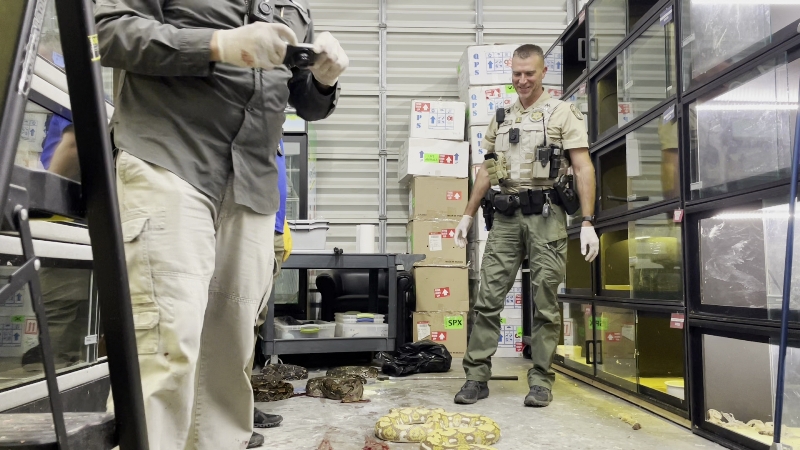
Above: An FWC officer smiles as he surveys the scene after the killing of 34 pythons and a pregnant pet boa by FWC officers. (Photo by Chris Coffee, who has granted permission for this photo to be published and disseminated.)
For background on this story, see press releases at: www.usarkfl.net/news
For additional photos or information on this topic, or to schedule an interview, please call or text Daniel Parker, Director of Media for USARK FL, at 863-441-5067 or email media@usarkfl.net. Media outlets are given permission by Elizabeth Wisneski and Chris Coffee to publish photos and video contained in this press release.